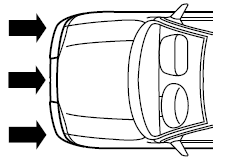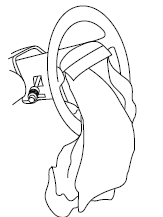 Ford Escape: How does the airbag supplemental restraint system work?
Ford Escape: How does the airbag supplemental restraint system work?
The airbag SRS is designed to activate when the vehicle sustains a longitudinal deceleration sufficient to cause the airbag sensors to close an electrical circuit that initiates airbag inflation. The fact that the airbags did not inflate in a collision does not mean that something is wrong with the system. Rather, it means the forces were not sufficient enough to cause activation. Front airbags are designed to inflate in frontal and near-frontal collisions, not rollover, side-impact, or rear-impacts unless the collision causes sufficient longitudinal deceleration.

The airbags inflate and deflate rapidly upon activation. After airbag deployment, it is normal to notice a smoke-like, powdery residue or smell the burnt propellant. This may consist of cornstarch, talcum powder or sodium compounds which may irritate the skin and eyes, but none of the residue is toxic.

While the SRS is designed to help reduce serious injuries, contact with a deploying airbag may also cause abrasions, swelling or temporary hearing loss. Because airbags must inflate rapidly and with considerable force, there is the risk of death or serious injuries such as fractures, facial and eye injuries or internal injuries, particularly to occupants who are not properly restrained or are otherwise out of position at the time of airbag deployment. It is extremely important that occupants be properly restrained as far away from the airbag module as possible while maintaining vehicle control.
The SRS consists of:
• driver and passenger airbag modules (which include the inflators and
airbags).
• seat-mounted side airbags. Refer to Seat-mounted side airbag system
later in this chapter
• Safety Canopy System. Refer to Safety Canopy System later in this
chapter.
• one or more impact and safing sensors.
• Safety belt pretensioners
• a readiness light and tone.
• diagnostic module.
• and the electrical wiring which connects the components.
• Front passenger sensing system. Refer to Front passenger sensing
system later in this chapter.
• “Passenger airbag off” or “pass airbag off” indicator lamp. Refer to
Front passenger sensing system later in this chapter.
The RCM (restraints control module) monitors its own internal circuits and the supplemental airbag electrical system wiring (including the impact sensors, the system wiring, the airbag system readiness light, the airbag backup power and the airbag ignitors).
![]() WARNING: Several air bag system components get hot after
inflation. Do not touch them after inflation.
WARNING: Several air bag system components get hot after
inflation. Do not touch them after inflation.
![]() WARNING: If the airbag has deployed, the airbag will not
function again and must be replaced immediately. If the
airbag is not replaced, the unrepaired area will increase the risk of
injury in a collision.
WARNING: If the airbag has deployed, the airbag will not
function again and must be replaced immediately. If the
airbag is not replaced, the unrepaired area will increase the risk of
injury in a collision.
 Children and airbags
Children and airbags
Children must always be properly
restrained. Accident statistics
suggest that children are safer when
properly restrained in the rear
seating positions than in the front
seating position. Failure ...
 Front passenger sensing system
Front passenger sensing system
The front passenger sensing system is designed to meet the regulatory
requirements of Federal Motor Vehicle Safety Standard (FMVSS) 208
and is designed to disable (will not inflate) the front passen ...
See also:
Punctured tyres
Do not drive the vehicle with
a
punctured tyre. Even if the punctured
tyre has not deflated, it is unsafe to
use, as the tyre may deflate suddenly
at any time. ...
Security System
If equipped
The security system helps to protect
your vehicle and valuables from theft.
The horn sounds and a combination
of headlights, parking lights, side
marker lights and taillights flash ...
Emergency Locking Retractor (ELR)
The driver’s seatbelt has an Emergency
Locking Retractor (ELR).
The emergency locking retractor allows
normal body movement but the retractor
locks automatically during a sudden stop,
impac ...
